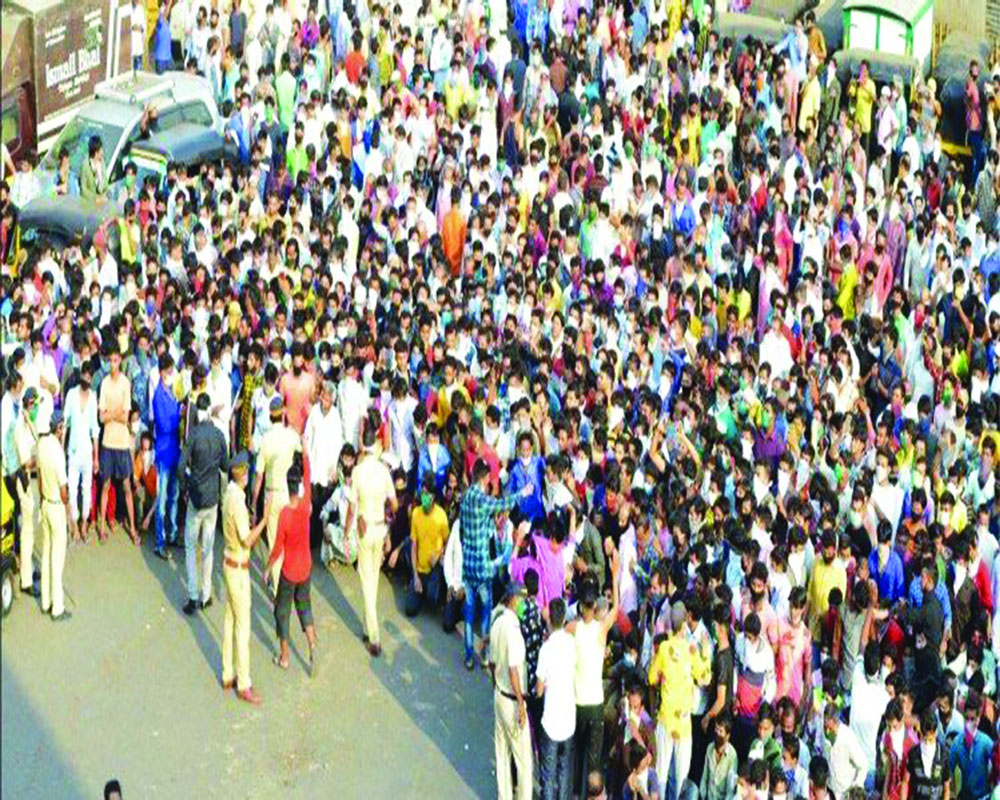If we want them back, there has to be a solid reason and incentive for them to do so. Confinement without food won’t do
Nothing much has changed for the about 20 lakh migrant labourers, who have been displaced by the lockdown to contain COVID-19, driven out of their site shacks following stoppage of economic activity and left to fend for themselves with little or no savings. Turfed out of an existence as they knew it, they began the long walk home, fleeing a disease that they had not asked for but were exposed to, and returning to their subsistence livelihoods in the village. At least, there they would eat whatever the land would yield and they would be safe. And then they were held in camps by different State authorities, sometimes subjected to disinfectant jet sprays and at other times treated like pests and looked at with suspicion even if they offered themselves up for any job at hand. Although the lockdown is now being opened in a staggered manner to enable farm activity and construction, the flight has meant that a chunk of these labourers would rather avail these income openings in their own villages and States than staying on in cramped camps. There is a reason why 1,500 labourers virtually revolted and gathered at a bus stand in Mumbai’s Bandra on Tuesday afternoon, demanding transport arrangements to go back to their native places. Their reasons are common to all inmates huddled at makeshift camps that came up in various States in fits and starts, rather than as part of a unified policy. For all tall claims by authorities, they have no food. The Food Corporation of India godowns may be full and we may have many times more reserves than are required but with the supply and distribution chain broken down and disproportionately functional in places, no rations have reached these camps. Most labourers do not get more than one meal a day at a time when body resistance and immunity are primary concerns. Media reports indicate some of them are surviving on just rice, starch and salt. Except for private charitable organisations and trusts, there is no directive that makes Government community kitchens mandatory and keeps them running. Makeshift common toilet facilities are another problem, causing hygiene related deficiencies and compounding the risk factor for contracting the disease. Besides, there are no work opportunities or any kind of stipend. Apart from spraying disinfectants, there is no medical camp that assesses their health condition, leave alone testing for the virus. So the impatience and frustration are just getting over the tipping point. And that anger is manifesting in furious ways, sometimes as an assault on policemen enforcing the lockdown, at other times looting and damaging trucks full of supplies or simply staging sit-ins, demanding that they be allowed to travel. A recent survey has shown that four out of 10 labourers did not have ration left even for one day and 90 per cent had lost their only source of income in three weeks.
There is also a latent emotional reason. Rejected overnight by cities that they have serviced over the years and their residents who went into self-protection mode, they now are angry and want life on their terms. And they want to be home, a basic human instinct when battling a threat to survival itself. Yes, the Government did tout the Pradhan Mantri Garib Kalyan Ann Yojana, that would ensure that each one would get an additional five kg rice or wheat per month. The problem with migrants is they do not have ration cards here but in their villages. Those who do cannot use them either, simply because they do not guarantee portability like an Aadhaar and can be used only at the address registered on them. Besides, clustered in unknown sites, they do not know how to access fair price shops. Perhaps food coupons would have been better. As it is, the mass exodus has affected the economy badly with agriculture and small industrial units lacking enough staff. Perhaps the States housing camps should prepare a roster of units going empty, farms in need of manpower and send labourers there for work after a health check-up and an assurance of a clean accommodation, howsoever temporary. If we want to keep them back, then there has to be a reason and incentive solid enough for them to do so. Factory and farm owners need to restore confidence like clearing their dues, something that most MSMEs cannot as the Government is yet to repay them. Different State Governments may have to issue several work permits to get them back and keep them safe in a post-Covid work environment. It would be prudent to let those, who have been allowed to drift away too far out, to return and let them avail of MGNREGA schemes in their native villages. It is time to revive the village economy and set up import substitution units to decentralise the growth engine and get small wheels moving and pick up speed. If a solution is not worked out soon, protests and clashes will become the new normal as the in-betweeners could fuel a social uprising. We have no right to decide for them from a position of privilege but must guarantee their productive worth instead.
(Courtesy: The Pioneer)








 OpinionExpress.In
OpinionExpress.In















Comments (0)